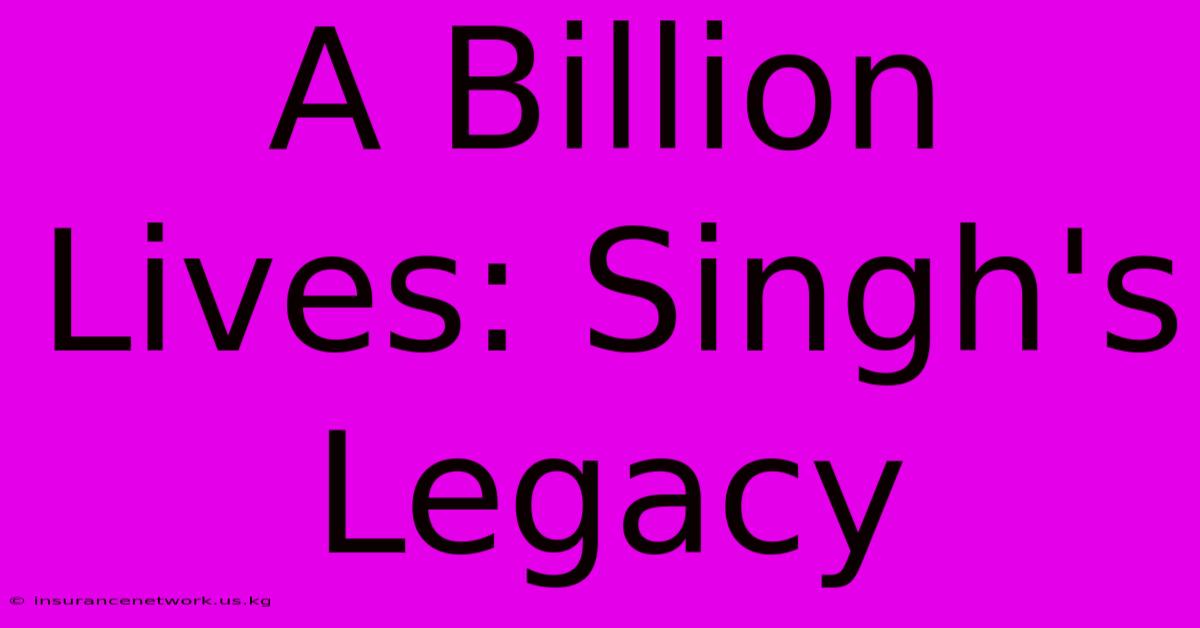A Billion Lives: Singh's Legacy

Discover more detailed and exciting information on our website. Click the link below to start your adventure: Visit Best Website insurancenetwork.us.kg. Don't miss out!
Table of Contents
A Billion Lives: Singh's Legacy – Impact and Controversy
Dr. Manmohan Singh's tenure as Prime Minister of India (2004-2014) remains a subject of intense debate and analysis. His legacy, often described as a quiet revolution, is complex and multifaceted, marked by significant economic reforms and yet, criticized for certain shortcomings. This article will delve into the key aspects of Singh's time in office, exploring both his achievements and the controversies that continue to surround his administration.
The Architect of Economic Liberalization
Singh's impact on India's economy is arguably his most defining legacy. Often referred to as the "architect of economic reforms," his early career as a renowned economist laid the groundwork for his later political achievements. He spearheaded the liberalization of the Indian economy, a process initiated in the 1990s but significantly accelerated during his premiership. This period witnessed:
- Increased Foreign Direct Investment (FDI): Significant inflows of FDI fueled economic growth and created employment opportunities.
- Rapid GDP Growth: India experienced a period of sustained high GDP growth, lifting millions out of poverty.
- Infrastructure Development: Investments in infrastructure, including roads, power, and telecommunications, contributed to overall economic progress.
The Strengths of Singh's Economic Policies:
Singh's emphasis on fiscal responsibility, coupled with market-oriented reforms, created a stable and attractive environment for domestic and international investment. His government successfully navigated global economic crises, demonstrating a degree of economic resilience. Furthermore, his emphasis on inclusive growth aimed to benefit all segments of society, though the extent of its success remains a subject of ongoing discussion.
Challenges and Criticisms: A Balanced Perspective
Despite his considerable achievements, Singh's premiership was not without its challenges and criticisms. These include:
- Inequality and Poverty: While overall poverty rates declined, concerns remain about the persistent inequality in wealth distribution and the lack of access to basic amenities for a significant portion of the population.
- Corruption Allegations: Several corruption scandals marred his tenure, raising questions about transparency and accountability within the government. These allegations, though not always directly implicating Singh, cast a shadow over his administration's image.
- Slow Pace of Reforms: Some critics argue that the pace of reforms in certain sectors, such as agriculture and education, was too slow to address deep-seated societal challenges.
- Lack of Strong Political Leadership: Singh's perceived lack of assertive leadership style was sometimes cited as a hindrance in pushing through crucial reforms and addressing pressing social issues effectively.
Addressing the Counterarguments:
It's crucial to understand that many of these criticisms are interconnected and nuanced. The challenges faced by Singh's government were often complex and deeply rooted in India's historical context. Attributing all failures solely to his leadership is an oversimplification. Furthermore, the positive economic transformations of his era cannot be dismissed simply due to the presence of persistent societal problems.
A Lasting Impact on India’s Trajectory
In conclusion, Dr. Manmohan Singh's legacy is a multifaceted and complex one. His contribution to India's economic liberalization is undeniable, resulting in significant economic growth and improved living standards for millions. However, the criticisms regarding inequality, corruption, and the pace of social reforms must also be considered. A complete understanding of Singh's legacy necessitates a balanced assessment of both his achievements and the challenges that persisted during his time in office. His tenure represents a crucial chapter in India's history, shaping its economic trajectory and leaving a profound, albeit contested, mark on the nation's development. Further research and analysis are necessary to fully comprehend the long-term implications of his policies and actions.

Thank you for visiting our website wich cover about A Billion Lives: Singh's Legacy. We hope the information provided has been useful to you. Feel free to contact us if you have any questions or need further assistance. See you next time and dont miss to bookmark.
Featured Posts
-
After Christmas Closeout Sales Amazon Walmart Target
Dec 27, 2024
-
December 27 Wordle Answer And Clues
Dec 27, 2024
-
Post Christmas Luggage Sales 124 Deals
Dec 27, 2024
-
Miami Hurricanes Coaching Change Larranaga Out
Dec 27, 2024
-
New Miami Basketball Coach Named
Dec 27, 2024
